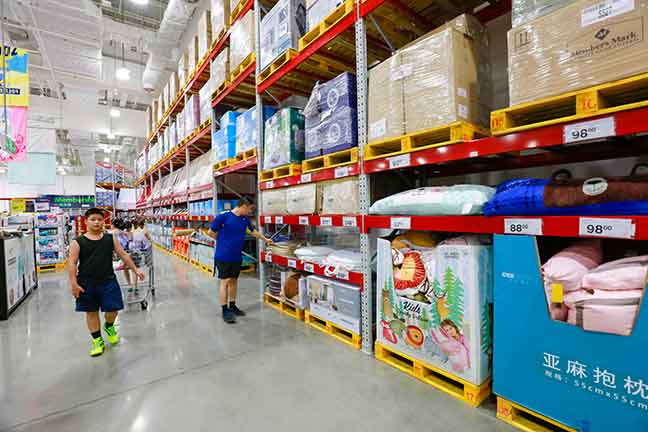With inflation hitting 40-year highs and a potential recession looming, many families are looking for ways to cut costs and make their dollars stretch further. One popular money-saving strategy is to buy household essentials and grocery items in bulk. But does buying in bulk save money loading up on jumbo packs and warehouse pallets actually lead to savings? The answer is yes—with some important caveats.
This article will provide tips on how to save money by buying in bulk the right way. We’ll look at which products tend to be the best deals when purchased in bulk, where you can shop to find your bulk purchase quantities, real-world cost comparisons, and key things to consider before tossing that oversized package into your cart. Let’s dive in!
What’s the Best Way to Buy in Bulk to Save Money?
Our top two tips for saving money on bulk purchases: only buy bulk quantity of what you know you’ll use, and compare prices diligently.
Buy What You Use
It’s tempting to grab giant containers of ketchup and mustard because of less packaging and the lower per-ounce cost. But if half of it ends up expiring and getting tossed, those savings never materialize. Stick to buying bulk sizes of items that you or your family will definitely use—ideally within the expiration timeframe.
Compare Prices
When comparing prices, look at both the total cost and the per-unit cost. For example, compare the total price for a 15-count versus 100-count box of granola bars. Then determine the per-bar cost to see which is truly a better deal. A little quick math can reveal the real bulk value.

Where Are the Best Places to Shop for Bulk Items?
Warehouse chains like Costco and Sam’s Club are go-to destinations for consumers buying household, grocery, and personal care items in oversized quantities. You’ll also find some bulk offerings at big box stores like Target and Walmart or via online retailers like Amazon.
Shopping directly from wholesalers can offer even deeper discounts, but you may have to purchase entire pallets or cases. Consider splitting cases with friends or family if large quantities are impractical for just your household.
What Food and Grocery Staples Should You Buy in Bulk?
Some categories tend to provide the biggest bang for your buck when purchasing jumbo sizes:
- Non-perishable pantry items like rice, oats, pasta, dried beans, canned goods, condiments, and cooking oils.
- Breakfast cereals, crackers, and other shelf-stable snacks.
- Beverages like juice, soda, and bottled water.
- Paper goods such as toilet paper, paper towels, napkins, tissues, paper plates.
- Cleaning supplies including laundry detergent, dish soap, all-purpose cleaners.
- Personal care basics like shampoo, toothpaste, deodorant, and soap.
Pay close attention to expiration dates, and buy only as much as you can use before the date. Certain products like sunscreen, spices, baking powder/soda may not justify bulk purchasing.

Which Food Items Should You Avoid Buying in Bulk?
Not everything belongs in that oversized shopping cart. Steer clear of warehouse store with bulk quantities of:
- Fresh produce – will it get used before spoiling?
- Meat, seafood, eggs, and dairy – do you have adequate freezer space?
- Baked goods like bread and pastries – can you eat it all before it goes stale?
- Snack foods – tempting, but can lead to overindulgence and waste.
In general, avoid bulk sizes of perishable foods unless you have a concrete plan to freeze or preserve them for later use. Also watch out for bulk deals on new food items your family hasn’t tried yet—picky eaters may reject them.
How Much Can You Save Buying Meat in Bulk?
Getting a great deal on bulk meat generally is cheaper and requires having a large freezer to store it long-term. You also need to be comfortable with larger cuts of meat and the time needed to portion it for individual meals.
Warehouse clubs sell meat in bulk or in large family packs. For even bigger quantities, explore farm-to-table meat suppliers or warehouse stores that offer mixed quarter-cow boxes and discounts for buying half or whole animals. Splitting the cost with friends can make meat bulk-buying more affordable.
What Kind of Yearly Savings Can Bulk Buying Achieve?
At first glance, the lower per-unit pricing on bulk items may not seem like massive individual savings. But little savings add up substantially for bulk shoppers over the course of a year. Let’s look at the yearly savings opportunity on just three hypothetical bulk purchases:
- Oats: Breakfast for your family of 4, 5 days a week = $182 yearly savings
- Granola bars: 1 per day lunches for 3 kids = $117 yearly savings
That’s over $300 saved annually just by buying three items in bulk sizes! Now imagine extrapolating similar savings across all your grocery and household purchases. Buying in bulk can easily save the average household $1000+ per year.

What Should You Consider Before Stocking Up in Bulk?
While it does tend to save money in the long run, buying items in jumbo sizes isn’t always the right fit or shelf life. Ask yourself:
- Do I realistically have enough storage space?
- Can I use this up before it expires?
- Will bulky quantities make me use more than necessary?
- Have I budgeted for the upfront cost?
Also factor in club membership fees if shopping at a wholesale store or warehouse. Ensure you’ll shop frequently enough to justify the annual fee through bulk savings.
Get Even Bigger Savings with FREE Cell Phone Service
Want to discover another easy way to put cash back in your wallet? If you qualify for government assistance programs or through your income, you can get entirely free cell phone service including Unlimited Talk, Text, and Data.
The Lifeline and Affordable Connectivity Program (ACP) provides discounted or free home internet and cell phone service to lower-income households. The average cell plan with data costs around $50 per month. Over the course of a year that’s $600 wasted on cell bills.
But with FREE service through Lifeline and ACP, you keep that cash to spend on other essentials for your family.
Over 40% of U.S. households qualify based on their income level or participation in programs like Medicaid, SNAP, and public housing assistance.
EASY Wireless Makes Getting Free Service Simple
Through EASY Wireless, applying takes just minutes online. If approved, you’ll receive an unlimited talk, text, and data cell plan completely free each month. There are no contracts or hidden fees.
Ditch the cell phone bill and keep $600 extra in your pocket this year. See if you qualify with EASY Wireless and get unlimited data and service at no cost to you. Every dollar counts, so start saving now!
Start Saving Today!
Start Saving Today!
Buying in Bulk Does Save Money With the Right Strategy
At the end of the day, buying essentials in bulk can lead to tremendous savings on household and grocery costs. But it requires carefully choosing which items truly make sense based on your family’s needs, consumption, and budget.
Target non-perishables and items you know your family will use up. Look for at least 25% cost savings versus regular retail packs. And commit to an organized system to use bulk quantities before their expiration date.
With the right buying strategies, bulk shopping can easily save the typical household $500+ per year. Now go grab that jumbo pack of TP and laugh your way to the bank!


